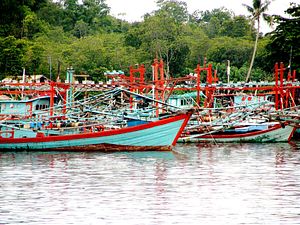On Monday, Indonesia announced that it had seized yet another Chinese vessel suspected of illegal fishing around the country’s waters. The development was one more sign of the Southeast Asian state’s insistence on pursuing its declared war on illegal fishing, which has been made a key priority under Indonesian President Joko “Jokowi” Widodo.
As I have noted before in these pages, one of the most visible manifestations of Jokowi’s emphasis on the maritime realm since coming to power in October 2014 has been clamping down on illegal fishing (See: “Explaining Indonesia’s Sink The Vessels Policy Under Jokowi”). Jokowi himself has emphasized the sheer magnitude of the problem, saying that though Indonesia is the world’s second largest fish producer, 5,000 ships operate illegally in Indonesian waters each year, making a mockery of Indonesian sovereignty and resulting in annual losses of over $20 billion.
While Indonesian officials have been keen to emphasize that this war on illegal fishing consists of a range of important economic, legal, and diplomatic efforts that are being undertaken at home and abroad – ranging from a moratorium on issuing business licenses to the setting up of local fisheries courts to addressing aspects of the issue through regional and international fora – media attention unsurprisingly has overwhelmingly focused on the seizure and sinking of vessels (See: “Indonesia Wants Global War on Illegal Fishing”).
So far, in 2017, the government has sunk 128 illegal fishing vessels, and, all in all, over 300 have been sunk since Jokowi came to office. Most of these vessels have come from neighboring Southeast Asian states rather than China; Indonesian officials have tended to be more careful in how they address Chinese cases lest they complicate ties with Beijing more than they need to. And while there have been signs of moderation in some aspects, including how the vessels are sunk as well as select diplomatic efforts with concerned countries, the seizure and sinking of ships itself shows no sign of stopping. Indeed, as I noted last month, Maritime Affairs and Fisheries Minister Susi Pudjiastuti has continued to play up the success of Indonesia’s tough line on the issue, touting figures such as the doubling of fish production from 6 million tons to 12 million tons per year and indicating that sinking ceremonies continue to be planned out for the rest of 2017 (See: “Indonesia’s War on Illegal Fishing Continues with New Sinkings”).
On Monday, in yet another development in this aspect of Indonesia’s crackdown on illegal fishing, Susi told a press conference in Jakarta that Indonesia had seized Fu Yuan Yu 831, a 598-ton Chinese fishing vessel that was one of the main foreign vessels suspected of engaging in illegal fishing in Indonesian waters. She said that the ship was seized by the ministry’s Maritime and Fisheries Monitoring Task Force (PSDKP) patrol boat Hiu Macan 03 after it was spotted by the Australian Fisheries Management Authority and Indonesian fishermen.
Indonesian authorities have confirmed that they arrested 21 crew members on board last Thursday evening, seized the catch (which included 35 tons of fish and protected tiger sharks), and subsequently took the ship to Kupang Port for further investigation. In the sort of deceptiveness typical in such instances, the Chinese fishing boat had flown the flag of Timor-Leste and had five other national flags on board – those of China, Indonesia, Malaysia, the Philippines, and Singapore – an action that violates international law. The Fu Yuan Yu 831 is listed as being owned by Fuzhou Hongdong Pelagic Fishery Co. Ltd., which is based in Fuzhou, China.
No further details were provided by Indonesian officials as to the next steps that would be taken, with the investigation still pending in concert with others, including Timor-Leste. But the seizure illustrates that Indonesia’s war on illegal fishing continues on, as it is likely to do into 2018.
































